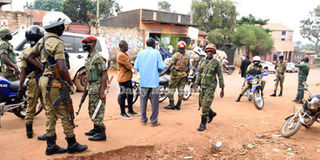Prime
2021 elections not free and fair – Local observers

Police and military personnel man a polling station in Rubaga Division in Kampala during the mayoral elections on January 20. PHOTO/RACHEL MABALA.
What you need to know:
- The observers were mandated to assess the level of inclusiveness, transparency, and accountability in the polling process.
The just concluded presidential and parliamentary elections were characterised by widespread violence, intimidation and human rights abuses, observers attached to Pallisa Civil Society Organisations Network (Paconet), a non-government organisation, have said.
The organisation says it deployed 21 observers on long-term basis and 156 on short-term in Bukedi sub-region, which comprises the districts of Pallisa, Budaka, Busia, Tororo, Butaleja, Kibuku, and Butebo to monitor the elections.
Mr Paul Kossa, the Paconet programme coordinator, told journalists during a press conference at their offices in Pallisa Town on Monday that their findings show the exercise was marred by cases of intimidation, human rights abuses and killings.
“During the election campaigns, security forces violently clamped down on Opposition members, arresting scores, which was against the international principles of free and fair elections,” he said.
“These principles and standards guide the development and implementation of election systems, laws, policies and procedures concerning democratic election processes,” he said.
He added that only a few candidates accessed and afforded media publicity for their campaigns, which put them at an advantage over their counterparts.
“This created an unlevelled playing ground. The situation was made worse by the shutdown of social media platforms and citizens witnessed disruptions in access to the Internet,” he said.
He said this affected communication between different actors in the electoral process, especially the voters and also hampered the potential of citizens to observe the polling process through citizen journalism.
This, he said, inadvertently affected Ugandans.
Mr Kossa, however, said heavy deployment of the military and quasi-military units witnessed across major cities created fear and anxiety among some citizens.
“The deployment took away the standard which requires an electorate to be free to make political choices without intimidation, undue influence or fear of retribution for their vote,” Mr Kossa noted.
The Electoral Commission (EC) accredited 2,184 stationary observers based at the sub-county level and 270 roving observers in all the 146 districts.
The observers were mandated to assess the level of inclusiveness, transparency, and accountability in the polling process.
Mr Michael Kirya, one of the observers in charge of Iki-Iki County in Budaka District, however, said polling stations were located in public, open and accessible venues that were convenient to all the voters.
“The general polling process went on smoothly without any major violations, with the exception of a few cases,” Mr Kirya said.
Mr Godfrey Olebo, another observer in charge Kibuku County, said several biometric voter identification machines at most polling stations failed to work.
“This was mainly attributed to either the electoral officer’s incompetence to operate the machines or wrong codes for the kits given,” he said.
Mr Andrew Gabengere, another observer in charge Gogonyo County in
Pallisa District, urged the EC to intensify voter education in future in order to increase voter turn up.



